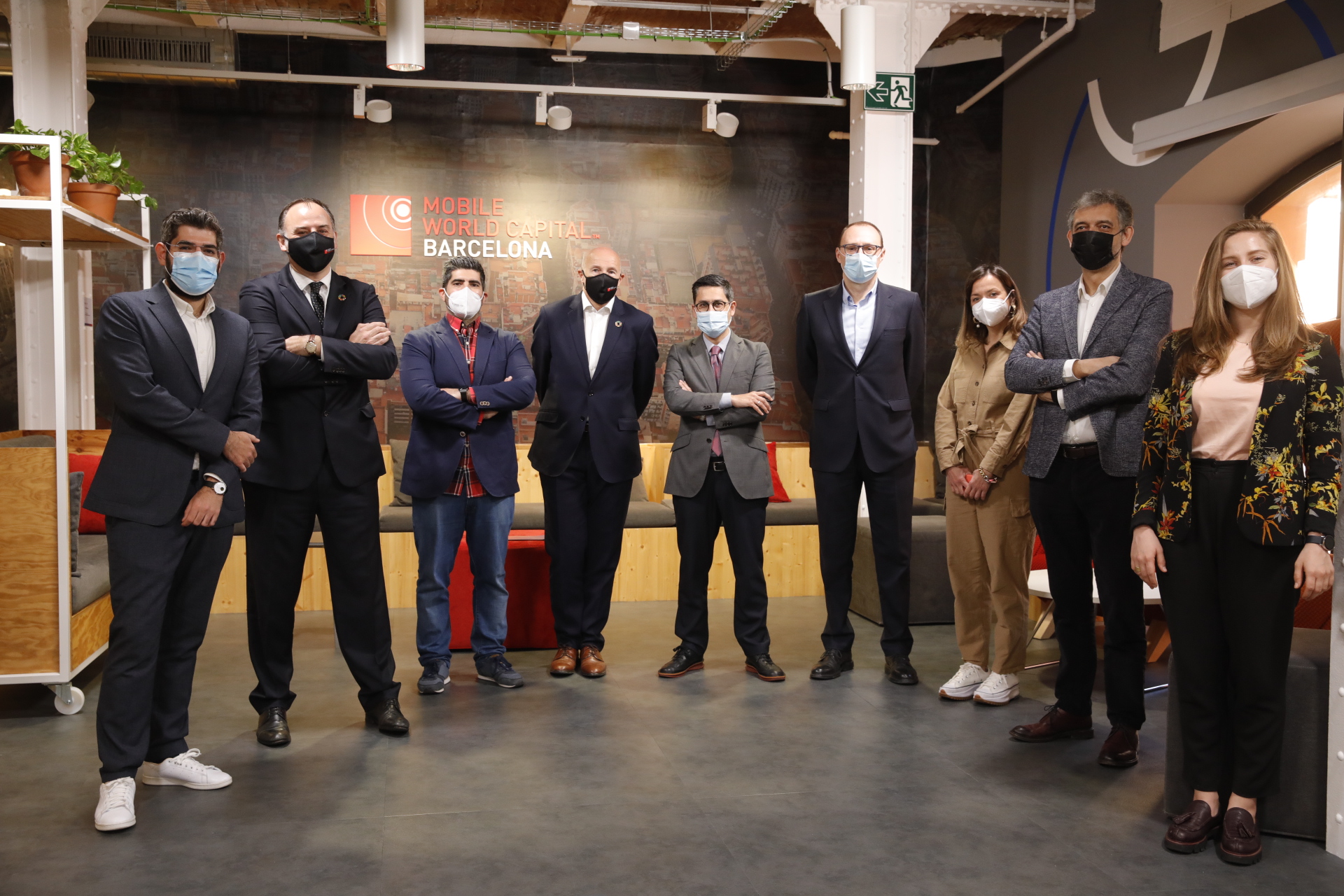
- Catalonia meets all the conditions necessary to become the next European Digital Health hub: it has four of Spain’s ten best hospitals, is the convergence point for the sector’s major players and has now created over 1,500 startups in all sectors
- These data are from the first The Collider report on Digital Health, which was produced in collaboration with Vall d’Hebron University Hospital and points to the opportunities and challenges of a strategic sector that in 2023 will account for a global market worth nearly 200,000 million euros

22 March, 2021
Barcelona, 22 March 2021.- The Collider, the innovation programme of Mobile World Capital Barcelona (MWCapital), today presented a report on digital health that points to the challenges generated through the use of technology in the health sector. The study also mentions technology transfer as a channel for unleashing the full potential of Digital Health, a sector that is strategic both for Spain and, particularly, for Catalonia and Barcelona. The report was presented jointly today by the CEO of Mobile World Capital Barcelona, Carlos Grau, together with the Chairman of the Innovation Committee of Vall d’Hebron Barcelona Hospital Campus, Dr Josep Antoni Ramos Quiroga, and the Director of The Collider, Oscar Sala, at an online press conference. The presentation also included a round table, formed by Dr Josep Antoni Ramos Quiroga; Dr Manel Escobar, Clinical Director of the Institute for Diagnostic Imaging (VHIR ); Dr César Velasco, Director of Innovation of Novartis Pharma; Carlos Fina, CEO of Esteve Teijin Healthcare and Luis Castillo, CEO of Psicoterapia VR.
The health sector is currently very much conditioned by three factors: an ageing population, chronic illness (the WHO estimates that 75% of health budgets are allocated to treating diabetes, cancer and respiratory and cardiovascular diseases), and the rising cost of healthcare. In this context, Digital Health, a global market that the consulting firm Frost & Sullivan estimates will be worth 200,000 million euros in 2023, will definitely represent a turning point.
Digitisation of the sector will make it possible to democratise healthcare and make it more human, to make strategic decisions based on data, to improve diagnoses, to have access to a top-quality service at a lower price, to discover new lines of business and to boost research and development (R&D). The application of technology also directly affects not only the healthcare system, but also other stakeholders such as suppliers, healthcare professionals, patients and governments.
According to Carlos Grau, “in the current circumstances it is particularly important to understand the opportunities offered by digital health. In this case technology is addressed to covering shortfalls and is therefore an ally to every healthcare system that over the last few months has been subject to great stress because of the Covid-19 pandemic.”
Dr Josep Antoni Ramos Quiroga explained that “the Digital Health report reveals the great opportunity presented by the effective implementation of digital health in the healthcare sector. One of the greatest challenges, meanwhile, is the integration of data generated by different digital health devices in the electronic health record of the patients we see at healthcare centres. At Vall d’Hebron we are working to ensure that this integrated electronic health record becomes a tool that provides a better idea not only of patients’ clinical details, but also of the social challenges we must deal with. It offers a major opportunity to establish more amenable and personalised person-centred healthcare”.
“If there is no talent, there is no innovation. Without innovation we would not be able to create sustainable healthcare systems, which are currently proving to be the backbone of all countries. We need to boost research as it is the key to opening the door to our country’s social and economic development”, stated Oscar Sala.
Life-saving technology
The application of new technologies in the health sector is yielding some changes that directly affect the patient environment. Although patients have always been the focus of attention, changes have been observed in the way they are cared for, the capacity for diagnosing them and the techniques that are applied in accordance with their condition. A good example of this is to be found at Vall d’Hebron Barcelona Hospital Campus, which over the last few years has run a series of projects based on new technological applications such as the Surgical Block, a pioneering Virtual Reality treatment for Attention-deficit/hyperactivity disorder (ADHD), Telemedicine and high-performance diagnosis based on mass sequencing.
Constant technological evolution means that hospitals are now immersed in a process of change, which makes them more technological, accurate, effective and efficient places. Changes are occurring throughout the entire process of inpatient and outpatient care, from diagnosis to treatment. Artificial Intelligence, robotic surgery, 3D printing, Virtual Reality and voice recognition are all examples of technologies that allow for improvements across the board to enlarge the scope of diagnostic tests, operating theatres and ICUs.
A future scenario
The digital transformation of the health sector involves a series of challenges that must be met in order to greet the new scenario with complete assurance. The two main challenges and those covered by the report are:
- Confidentiality and data security: This will be one of the main global debates on Digital Health. It is not only a matter of who owns these data, but also of the excess information that patients will have and of the fragmentation of the Spanish healthcare system due to data interoperability.
- Digital transformation is also cultural: It will be important to deal with the fears and reluctance that could arise because of the changes about to occur. It will also be crucial to raise professionals’ awareness of the new skills and abilities that are becoming increasingly necessary with the transformation of the health services.
- Intense regulation of the sector: It will be important to consider how aspects such as data ownership or the purchase of digital services are regulated. The challenge here is how to operate within regulatory frameworks that have not yet adapted to the use of new technologies and also to engage in the ethical debate raised by technology and its new potential.
- The goals are more important than the technology: Generating technological tools without having defined the need to be met or without consideration for the people involved would be a mistake.
- Heterogeneous skills: The diversity of digital skills among different stakeholders could obstruct communication and therefore hinder existing and future collaborative relationships. It will also be essential to establish an interdisciplinary consortium involving representation of all stakeholders that allows for the development of political strategies and regulatory frameworks for encouraging progress in the digital transformation of the health sector regionally, nationally and on a community level.
- New models: Hybrid procurement instruments and financing models for encouraging companies to invest in innovation and digital solutions are lacking.
The incorporation of technology in healthcare also yields economic, social and even environmental opportunities. The opportunities included in the report represent a pledge to a more collaborative model, flexibility and efficiency in the design of care processes, the extreme personalisation of health services, the humanisation of healthcare, improved access to health and the creation of a more sustainable system.
To analyse all this, The Collider study has involved the collaboration of experts such as Jaume Pérez Payarols, Director of Research and Innovation of Hospital Sant Joan de Déu; Xabier Tibau, Strategy Manager of Esteve Teijin; Paulina Cerdá, Quality Manager of Esteve Teijin; Luis Badrinas, CEO of Barcelona Health Hub & Community of Insurance; Ricardo Castrillo, General Director of Ferrer in Spain; Laia Arnal, Business Development Director of Vall d’Hebron Institute of Research; Marta Príncep, Managing Partner of Barcelona Health Ventures; Joan Cornet, Director of European Connected Health Alliance and Director of Digital Health Transformation of AIS; and José Marcilla, General Director of Novartis Oncology.
A key sector
Health is one of Spain’s strategic sectors and its healthcare system is based on universal access. The country, which has a life expectancy of 83.4 years (the European Union’s highest), also has a solid primary healthcare system and less pronounced social inequality than other countries.
In recent years, however, the system has been affected by the economic crisis and a lack of investment in technology. A growing proportion of the population with chronic diseases and disabilities is placing further pressure on a sector that is becoming increasingly costly.
Catalonia, meanwhile, meets all the conditions necessary to become the next European Digital Health hub. The system’s bases are solid: Barcelona is home to four of Spain’s ten best hospitals (Hospital Clínic, Hospital Vall d’Hebron, Centro Médico Teknon and Hospital Quirónsalud) and it is also a point of convergence for major players in the sector such as Almirall, Ferrer, Uriach, Novartis, Sanofi, Merck, Esteve and Grifols.
In terms of innovation, Catalonia not only stands out for its expenditure on R&D (according to the latest data from the Spanish Statistical Office -INE- Catalonia accounts for 23.5% of Spain’s investment in R&D), but it is also a pole that attracts technology and digital companies. In all sectors, over 1,500 startups have now been created in Catalonia. As far as generating talent is concerned, Catalonia is the Spanish autonomous community with the highest number of graduates, and master’s and doctorate students in the health and the life sciences.
Stay up to date about everything
Subscribe to stay up to date with the latest content from Mobile World Capital Barcelona.